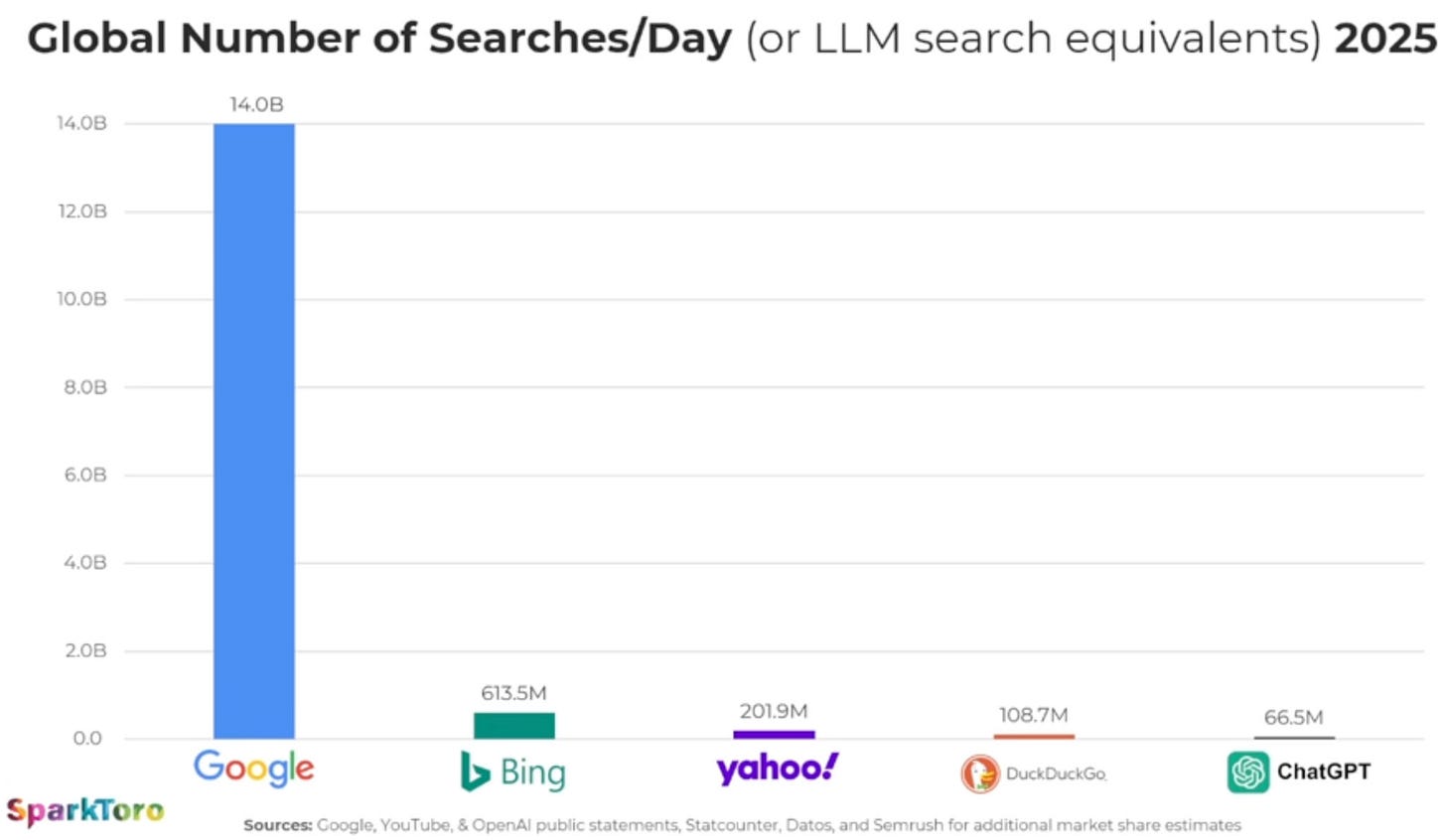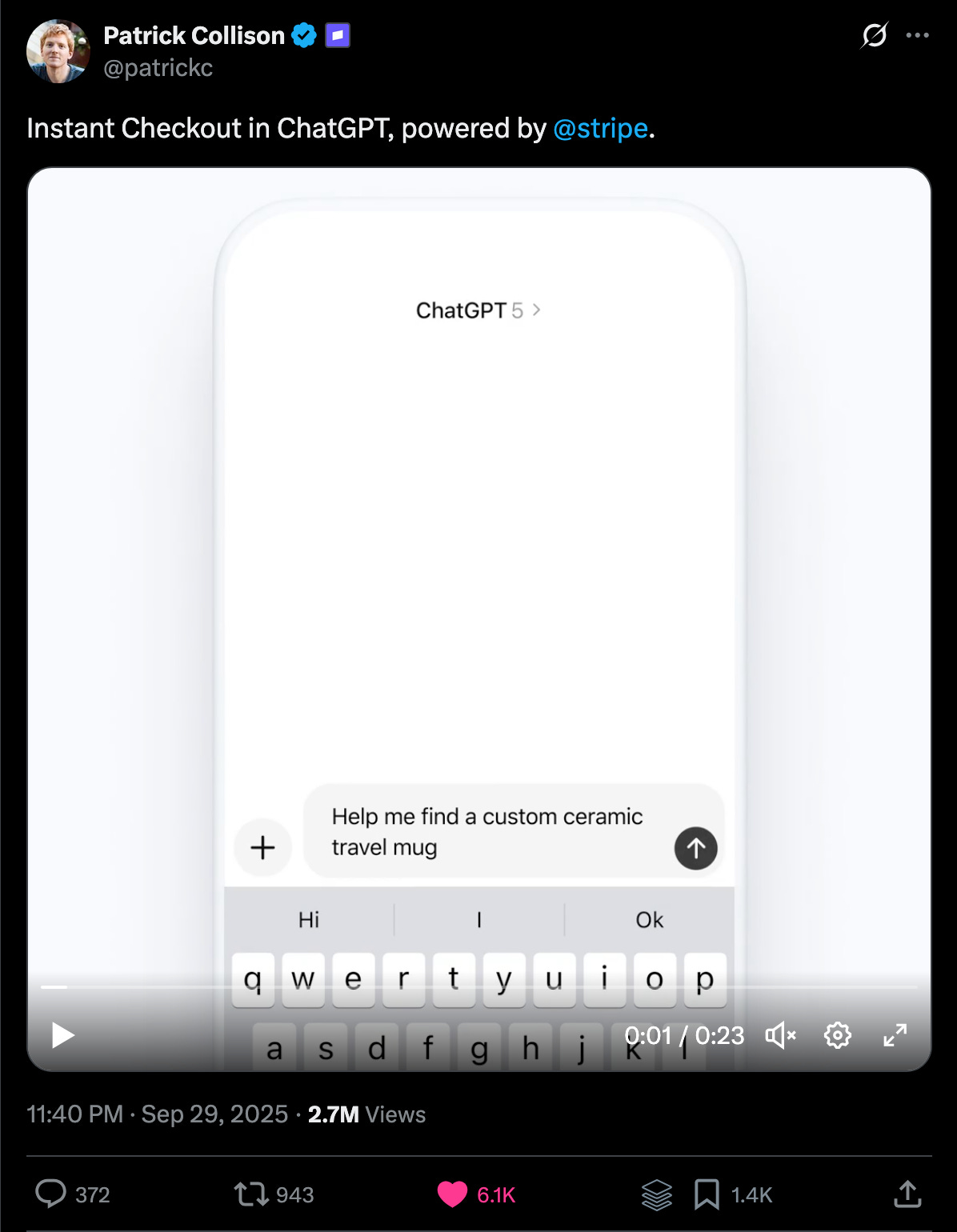Google still leads 210x, plus what's changing in search & AI | HighDegree* - Issue 09
ChatGPT search hype vs. reality, plus new tools and warnings for SEO
Hi marketing friends,
Welcome to the new issue of HighDegree*: Cutting Through the Noise in SEO & Digital Marketing
The AI search conversation is everywhere, but the numbers tell a different story than the headlines suggest. Google still processes 210 times more searches than ChatGPT daily, even as new API tools and AI modes reshape how people discover information. This week, we’re cutting through the noise: hard data on search volume, insights from Google’s head of search, a powerful new API for developers, practical domain expansion options, and a cautionary tale about AI translation errors. Whether you’re tracking traffic, planning content, or choosing the right tools, here’s what matters now.
Let’s jump in —
➞ In this Week
Google Handles 210x More Searches Than ChatGPT And It’s Not Close
Google’s Search Chief Says AI Augments, Doesn’t Replace Search
Perplexity Launches Search API With Internet-Scale Reach
Four New Country-Code Domains Help You Build Local Trust
AI Translations Are Poisoning Small-Language Wikipedias And AI Training Data
➞ Subscribe
If you are not subscribed to HighDegree* Yet, please subscribe to us by clicking the “Subscribe” button below. I will post every issue to HighDegree* substack version, so you can get it instantly in your inbox every time I hit publish!
➞ Google Handles 210x More Searches Than ChatGPT And It’s Not Close
Despite the AI hype, Google still dominates search by a massive margin. ChatGPT processes roughly 66 million “search-like” prompts daily, while Google handles about 14 billion searches per day - 210 times more, according to SparkToro CEO Rand Fishkin. Even DuckDuckGo sends more referral traffic than ChatGPT. OpenAI reported 2.5 billion total prompts per day in July, but a Harvard/OpenAI study found only 21.3% qualify as search-intent queries, the rest are conversations, code generation, and API calls. Meanwhile, BrightEdge data shows AI search drives less than 1% of total referrals.
The takeaway? AI tools are growing, but traditional search still delivers the vast majority of discovery traffic. Focus your SEO efforts where your audience actually is: Google Search.
Read the full breakdown of AI vs. traditional search ➞
Now that we’ve established where search traffic actually lives, let’s look at what Google’s leadership is saying about the future.
➞ Google’s Search Chief Says AI Augments, Doesn’t Replace Search
Elizabeth Reid, VP of Google Search, recently sat down for an in-depth interview covering AI Overviews, blue links, SEO changes, and agentic features. Key insights: AI Mode has surpassed 100 million monthly active users in the US and India, but Reid emphasized that “we don’t view AI as replacing search—we view it as augmenting it.”
Users are asking 2–3x longer queries with more context, and they still want to hear from trusted human sources, especially for high-stakes decisions. Reid’s advice for publishers? Focus on high-quality, detailed content with unique perspectives, not shallow manufactured pages. Since users get quick facts from AI Overviews, they’ll click links to go deeper, so optimize for great landing-page experiences.
The blue link isn’t dead; it’s evolving. SEO remains essential, but the playbook now rewards depth and originality over keyword-stuffed fluff.
Learn how to adapt your content strategy for AI Overviews ➞
While Google refines its AI features, a new player is offering developers direct access to global-scale search infrastructure.
➞ Perplexity Launches Search API With Internet-Scale Reach
Perplexity just released its Search API, giving developers programmatic access to the same infrastructure powering its answer engine, an index covering hundreds of billions of webpages. Unlike legacy search APIs that provide restricted data, Perplexity’s API returns rich structured responses with fine-grained, ranked snippets already extracted from documents, reducing preprocessing time and speeding integration. The company emphasizes accuracy and freshness: its systems process tens of thousands of index updates per second, making it ideal for AI agents that fail when information goes stale.
Perplexity also released an open-source evaluation framework (search_evals) so developers can benchmark any public search API on relevance and latency. Pricing sits at the Pareto frontier of performance and cost. For developers building AI-driven products- chatbots, research tools, or data apps; this API democratizes access to internet-scale search without maintaining your own index.
Explore the Perplexity Search API documentation ➞
Beyond search APIs, practical infrastructure decisions like domain strategy still matter for local trust and discoverability.
➞ Four New Country-Code Domains Help You Build Local Trust
WPMU DEV just launched four new country-code top-level domains (ccTLDs): .com.au and .net.au for Australia, .us for the United States, and .nl for the Netherlands. These extensions signal local presence and credibility—critical for businesses targeting regional audiences. .com.au works well for Australian companies wanting to appear established; .nl is widely trusted across Europe; .us suits American organizations and creators. You can now choose from 267+ domain extensions total, from classics like .com and .org to niche options like .shop or .design. Transfer support is live for .us domains; others can be connected via Auto DNS, which scans your existing provider and imports DNS records automatically.
Whether you’re expanding into new markets or consolidating management under one platform, ccTLDs offer a straightforward way to improve local recognition and trust.
Read the full report from wpmudev.com ➞
While new tools expand reach, it’s worth pausing to see where AI automation can go wrong, especially for smaller communities.
➞ AI Translations Are Poisoning Small-Language Wikipedias And AI Training Data
When Kenneth Wehr took over Greenlandic Wikipedia, he found that nearly every article was machine-translated by people who didn’t speak the language; riddled with errors, nonsense words, and basic mistakes like claiming Canada had 41 inhabitants. Volunteers estimate 40–60% of African-language Wikipedias and over two-thirds of Inuktitut Wikipedia pages contain uncorrected machine translations. The problem: AI models like Google Translate and ChatGPT train on Wikipedia text, so errors become embedded in future translations, a “garbage in, garbage out” doom loop. For vulnerable languages with limited online text, Wikipedia is often the largest training source. Poorly translated pages harm language learners, discourage native speakers, and accelerate language extinction. Greenlandic Wikipedia is now being shut down and moved to an incubator.
The lesson? Automation can cause irreversible damage without human oversight, especially in underresourced communities. Quality always beats quantity.
Understand the risks of unchecked AI automation ➞
➞ From Google
Everything from Google search this week —
→ Google released AI mode globally in Spanish language (blog.google)
→ Google launched Search Live has officially in English in the U.S. (blog.google)
→ Google AI Mode Travel Planning Gains More Features (seroundtable.com)
→ October 2025 Google Webmaster Report (seroundtable.com)
→ Google AI Mode With More Visual Responses & Visual Fan-Out Technique (seroundtable.com)
→ Google Explains Expired Domains And Ranking Issues (searchengineland.com)
➞ AI + Social
Find out what’s happening in the social media and artificial intelligence world —
→ OpenAI Sora app is going crazy viral (x.com) -
→ OpenAI Launches Video Generator App to Rival TikTok and YouTube (wsj.com) - Learn more about the launch here from WSJ.
→ Buy it in ChatGPT: Instant Checkout and the Agentic Commerce Protocol (openai.com) - OpenAI is taking first steps toward agentic commerce in ChatGPT with new ways for people, AI agents, and businesses to shop together.
→ Google is right now they are not going to roll out instant checkout in AI mode - (x.com)

→ OpenAI is staffing up to turn ChatGPT into an ad platform (searchengineland.com) - OpenAI’s latest hire hints at a future where advertisers can run campaigns directly in ChatGPT, reaching 700 million weekly active users.
→ OpenAI is introducing apps in ChatGPT and the new Apps SDK (openai.com) - A new generation of apps you can chat with and the tools for developers to build them.
→ OpenAI also launched ChatGPT Pulse (openai.com) - Pulse is a new experience where ChatGPT proactively does research to deliver personalized updates based on your chats, feedback, and connected apps like your calendar.
→ Perplexity Launches Comet Browser For Free Worldwide (searchenginejournal.com) - Perplexity released its Comet browser free to the public after a limited beta. The free browser includes built-in AI assistant features.
→ Overall, about half of U.S. adults (53%) say they at least sometimes get news from social media, roughly stable over the last few years. (pewresearch.org) - Smaller shares of Americans regularly get news on Instagram (20%), TikTok (20%) or X, formerly known as Twitter (12%). Fewer say they get news on Reddit (9%), Nextdoor (6%), WhatsApp (5%), Threads (3%), Rumble (2%), Truth Social (2%) and Bluesky (2%).
→ I liked this OpenAI ad (x.com)
➞ Worth Reading
These are the articles that will help you refine your marketing knowledge —
→ Giving users choice with Cloudflare’s new Content Signals Policy -(blog.cloudflare.com)
→ Google AI Overviews Overlaps Organic Search By 54% - (searchenginejournal.com)
→ AI Engines Choose YouTube 200x More Than Any Other Video Platform—Your Brand Could Be Missing Out - (brightedge.com)
→ Microsoft Launches New Bing Places For Business - (searchenginejournal.com)
→ How to Audit Brand Mentions for Modern SEO - (ahrefs.com)
→ Check out these hidden ChatGPT operators - (x.com)
→ The ultimate guide to AEO: How to get ChatGPT to recommend your product | Ethan Smith (Graphite) - (lennysnewsletter.com)
→ The Secret Migration: How Site Navigation Changes Can Destroy SEO Without You Realising - (sitebulb.com)
➞ What This All Means for Your Strategy
Search isn’t standing still, but it’s also not being replaced overnight. Google still commands the lion’s share of traffic, even as AI tools like Perplexity and ChatGPT carve out niches.
The smartest move? Stay grounded in data, focus on quality content that serves real user needs, and choose tools like domains, APIs, or platforms that align with where your audience actually spends time. If this issue helped clarify the noise, forward it to a colleague or reply with questions. We’ll keep tracking what matters.
Until next week,
Nishat from HighDegree* Marketing Newsletter
P.S. Have a question about implementing these strategies? Hit reply – we read every email and often feature reader questions in future issues.
➞ Who is Nishat Shahriyar?
I am a Digital Marketing Strategist, doing this since 2007. Now working as a Product Marketing Lead at Fluent Forms (The best lead generation tool for WordPress), Previously at Fluent Support (The best WordPress Helpdesk Plugin).
Connect with me, if you are not connected through my LinkedIn or Follow me on — X/Twitter - @rednishat




